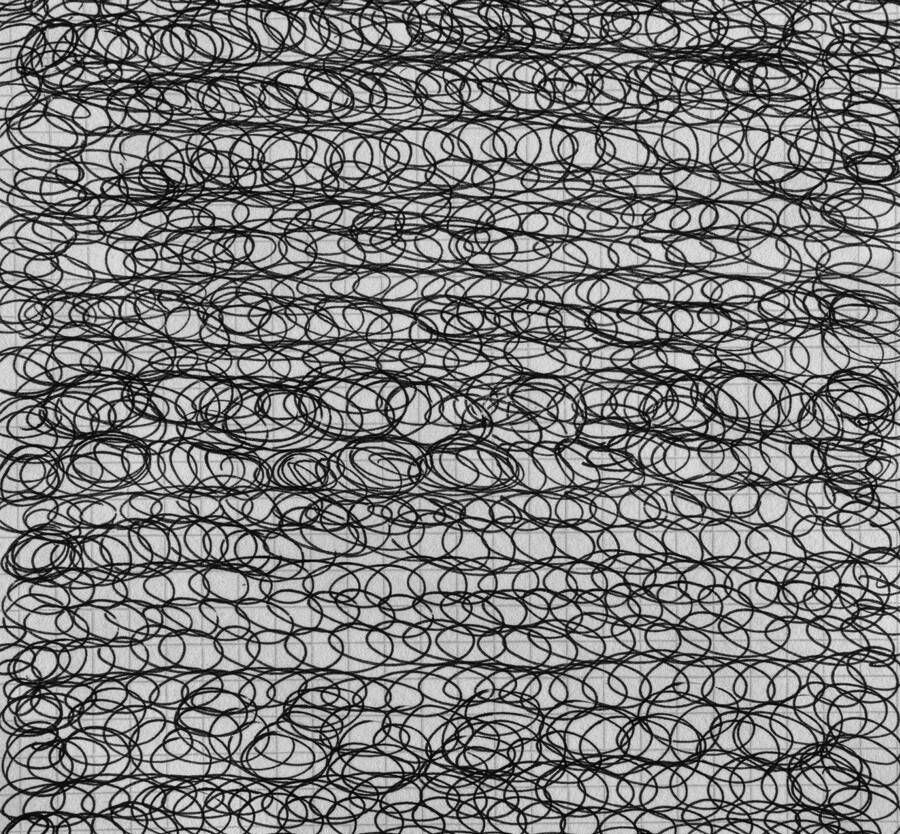Language: Replete with Transformative Monsters
In his essay “Sound and Sentiment, Sound and Symbol,” the poet Nathaniel Mackey relays the origin story of music as told by the Kaluli people of Papua New Guinea: A sister and brother go to catch crayfish. When the boy catches none, his sister refuses to share her bounty. Finally, the boy comes upon a shrimp, which pinches his nose, turning it purple like the muni bird’s beak. His arms become wings, and he flies away, mournfully singing, his lament like the bird’s “falsetto cry.” Mackey explains: “For the Kaluli, then, the quintessential source of music is the orphan’s ordeal—an orphan being anyone denied kinship.” Poetry shares this same vexed origin. “Poetic language,” he writes, “is language owning up to being an orphan, to its tenuous kinship with the things it ostensibly refers to.”
Mackey’s essay returns to me as I read Will Alexander’s poem “Language: Replete with Transformative Monsters,” which repeatedly undermines my attempts to find stability. If I move slowly, I can briefly catch hold of an image—“as if the Sun were a new red star shining / on an ice-strewn blackness”—but no sooner have I begun to build a world out from that image in my mind than the terms shift: “not flotational ozone that reflects / its own / static burial pattern / but remains bat-like / ungrafted.” If I relinquish meaning to the rhythm of the poem’s rapid transformations, the music overtakes. Neither all sound nor all sense, the language is monstrous like the boy in the Kaluli myth, neither all human nor all bird. And what is it to be monstrous but to refuse the enclosures of a singular affiliation? If kinship describes the arrangements of care and connection as they currently exist, then the lament of the orphan is a call toward a different kind of world, one where resources are not apportioned according the strictures of prescribed attachments—a song of “language not assembled embitterment / or ruse / or disjunctive gesture / but alive.”
– Claire Schwartz
Listen to Will Alexander read "Language: Replete With Transformative Monsters."
Language: Replete with Transformative Monsters
Language as scaled erisma as amplification that burns & activates its own neter or principle that blazes via written skill or utterance & sonically blinds with its own display then at times it ignites architectural imbalance never leavened or counted as enabling distraction but as ghost that sullies its own mirrors that scripts itself as blazing micro-wheel as insecticidal pattern that blurs that dispels its own leavening being contradiction that irrigates milk & salt aligned with temperature that leaps its own invasion of itself so that it multiplies & insults the stillness of precursive rational stillness & positively insults endemic rational linearity rational linearity that attempts to cleanse its own nightmare in the form of dialectical of prognostification that all the while falsifies poetic current this falsification attempts to raise & re-drown all that is living indeed poetic current not as inordinate savagery but as refined alchemical emblem as flow that annuls inherent carbon as fatigue for instance white heat as helium that forms a trellis of green mazes instinctive with alacrity that is molten transitional as perfection as ignited cerulean spindle as great white kelp that originates its own spinning what I understand to be uranian counter-flow gurgling within the wrath of its own shimmer the opposite of Venusian deltas rising as swans self-converging with themselves as perfectly condensed arteries prior to alienation not as static ruin or non-essential rambling but alive as phonemic density sans cognitive doctrine but as owls landing on curves that remain alive as aleatoric octaves in the forefront of themselves as if they were caves leaping from themselves being spectral sedition alive as phonemic immediacy beyond strange concussive calculation an immaculate conception of itself an incalculable frequency as if waters could bend as an operant magical steel as echo as transfigured astonishment perhaps as blank electrical moons beyond catastrophe trapped within an inoperable pluvial setting perhaps a gathering volcano of moons that exists as a wind-blown monicker or a dazzled bulletin or a graph beyond the state that erupts as in-grown engrown engagement with simmering hallucination beyond the percolation of coelacanths all in the name of suspended spell according to micro-alignment with its ghosts its journeys its spirals its coruscating condition as matter as maze that fundamentally scatters itself as quantum internality that further kindles its own spirit parallel to solar fire being alterity that beckons not as subsequent vehicular habit but as a form of dawn that re-inhabits itself as seeming mystical commencement being a rising arc of light being triangles bending as shapes that no longer fatigue themselves being blue arcana as mystery that mesmerizes itself & confronts its own entangling so that it embraces itself as anti-tautology as spring that glistens via anachronistic nerve ends that then spirals & fails its own conclusion as if the Sun were a new red star shining on an ice-strewn blackness alive as a feral of optimum engaging itself that optimizes strange infernos of itself so its spells rise foretell themselves according to blackened coloration dispelling its own disharmony not flotational ozone that reflects its own static burial pattern but remains bat-like ungrafted not as optimal saffron or coveted wind via conversational motive language not assembled embitterment or ruse or disjunctive gesture but alive peering into itself as honed emblem replete with transformative monsters
“Language: Replete with Transformative Monsters” from Divine Blue Light (for John Coltrane). Copyright © 2022 by Will Alexander. Reprinted with the permission of City Lights Books.
Will Alexander is a poet, novelist, playwright, philosopher, visual artist, and musician. He has earned many honors and awards including a Whiting Fellowship for Poetry, a California Arts Council Fellowship, the PEN/Oakland Josephine Miles Award, a Before Columbus Foundation American Book Award, and the 2016 Jackson Poetry Prize. He is currently the poet-in-residence at Beyond Baroque in Venice, California. He has lived his entire life in Los Angeles.

